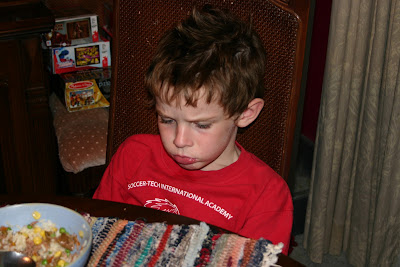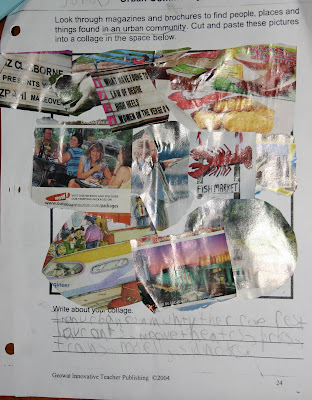Jonas stutters. My Grandfather did and so does my Aunt. I do sometimes as well. There is no one cause of stuttering. Current research indicates that many different factors, including genetic inheritance, the child’s language skills, the child’s ability to move his or her mouth when speaking, the child’s temperament, and the reactions of those in the child’s environment play a role in the development of stuttering. Whatever the cause, the resulting social and educational impacts are a significant concern for us.
As the kids were playing in the backyard yesterday, one of the new boys in the neighbourhood kept asking Jonas why he talks the way he does. I never heard Jonas answer him so I asked him about it this morning. He said he just ignored it and sometimes ran away. The boy wasn't making fun of him, as some of the other kids do, but he said it made him feel a little embarrassed.
How he deals with other children is something that we are working on together. One of the ways the adults in his life can help him is by having a better understanding of speech disfluencies and the strategies we can use to help him. With a belief that knowledge is power, I thought I'd share some of the insights we've gained since Jonas started speech therapy a couple of years ago.
What Is Stuttering?
Stuttering is a speech/language impairment characterized by disruptions in the forward flow of speech (or "speech disfluencies"), such as repetitions of whole words or parts of words, prolongations of sounds, or complete blockages of sound. (Jonas has each of these types of disfluency.) Speech disfluencies may be accompanied by physical tension or struggle, though many young children do not exhibit such tension in the early stages of the disorder.
Stuttering is highly variable – sometimes a child will stutter a lot and sometimes the child will be very fluent. Factors influencing the likelihood that stuttering will occur differ from one child to the next, but might include:
Who the child is talking to
What the child is talking about
Where the child is when talking
What time of day or year the child is talking
The child’s emotional or physical state (e.g., excitement, fatigue, illness) while talking
The length and complexity of the message the child wishes to convey
Other factors that are more difficult to identify
Many times, children experience fear or embarrassment because of their stuttering. As a result, they may learn to hide their stuttering so it does not show. They can do this by avoiding speaking in certain situations or to certain people. They might also avoid saying words they think they might stutter on or refrain from talking altogether. If a child begins to avoid speaking in order to avoid stuttering, the disorder can have a marked impact on his or her social, emotional, and educational development.
Sometimes, older children and adolescents become so adept at hiding their stuttering that other people may not even know that they stutter. Although this might sound like a good goal, it typically is not. Hiding stuttering takes a lot of emotional and cognitive effort and results in significant shame for the person who stutters. This, in turn, often limits the child’s ability to participate in life activities at school or in social settings. The best way to deal with stuttering is not to try to hide it, or to hide from it, but rather to face it directly.
What can we do to help?
We try to help Jonas help by: (1) providing a model of an easier, more fluent way of speaking, (2) reducing demands on him to speak, particularly demands to speak fluently, and (3) minimizing the time pressures Jonas may feel when speaking.
Modeling. Jonas tends to be more disfluent when he or the people around him talk more quickly. This is due partly to the increased time pressures he feels and also to Jonas’s own attempts to speak more quickly in order to keep up. We try to be aware of our speaking rate and make a conscious effort to speak more slowly.
Beyond reducing our own speaking rate, we can model for Jonas an easier, more relaxed way of speaking. One way to do this is by reflecting Jonas’s sentences back to him, using a slower speaking rate, then expanding Jonas’s words when responding to his questions. For example, if Jonas says "I want to play outside now," we can respond using a slower speaking rate, saying "You want to play outside now? (pause) Okay, that would be fine." This gives Jonas an immediate example of how to speak more easily and more fluently using a slower speaking rate.
Reducing Demands. Often, people feel uncomfortable when Jonas stutters. There is sometimes an irresistible urge to try to help him by telling him to "speak more slowly" or to "stop, take a deep breath, and think about what he wants to say." Although this might sound like good advice, it does not help, and only serves to make him more self-conscious about his speech. The same is true about finishing his words or making seemingly supportive comments about his fluency (e.g., "you said that so fluently"). Although such statements seem positive, Jonas interprets them as corrections since he typically doesn’t know what he did differently to make his speech fluent.We find that it is best to avoid any such corrections or demands on him to speak fluently. In treatment, Jonas is taught how to make these changes in his speech, and we learn ways to respond to his fluent and disfluent speech in a supportive manner.
Children are more disfluent when they use longer or more complex sentences. When Jonas is disfluent, therefore, it is helpful to limit our use of open-ended questions requiring long or complex answers (e.g., "what did you do at school today?"). Instead, we try using closed-ended questions requiring shorter, simpler answers (e.g., "did you have fun at school today?" or "did you go outside during recess?"). We also try to encourage Jonas to talk without asking any questions at all. We try to comment on his activities (e.g., "I wonder if it’s going to rain while you’re at school today") and give him an opportunity to respond. The key is to manage Jonas’s speaking situations carefully – at times when he is speaking more fluently, we feel comfortable stimulating his language development by using more open-ended questions.
Minimizing Time Pressure. One of the most helpful ways we can reduce the conversational time pressure Jonas may feel is to model and use a slower speaking rate as described above. Another useful technique is pausing, one to two seconds, before answering his questions. This gives him the time he needs to ask and answer questions, and it helps teach him not to rush into responding during his own speaking turns. Finally, this technique shows him how to take enough time before speaking to formulate their answers more fully.
Another important benefit of using pauses is that it helps everyone learn to take turns when speaking. The normal flow of conversation involves turn-taking – only one person speaks at a time. If two or more people are competing for talking time, or if one person interrupts another, there is a tendency for the rate of speech to increase and for the speakers to feel pressure to get their message out quickly. This is particularly difficult for children who stutter, so it is best to take turns when talking—each person gets an opportunity to speak without fear of being interrupted and without the need to hurry. We demonstrate this in our own speech by not interrupting Jonas (a part of pausing between speaker turns) and by managing the talking turns of other children so each child gets their turn to talk.
We also try to reduce overall time pressures by reviewing our daily routines to make sure Jonas’s schedule is not so busy that it does not leave time to talk about his experiences in a slow and unhurried manner. It is certainly good for children to have full and active lives; however, Jonas benefits more from participating in fewer activities that are enjoyed at a slower pace.
Listen to Content rather than Manner. Stuttering draws attention to itself, so it is not surprising that we might be more likely to hear Jonas’s stuttering, rather than the message he is trying to convey. Jonas quickly becomes aware of this, and it can increases his sense of shame or embarrassment about his speech even further. To reduce these negative feelings, we try to focus on and respond to Jonas’s message and to "talk about what Jonas talks about."
Respond to Stuttering in an Accepting Manner. No parent would want their child to have a stuttering problem; however, it is important that we convey complete acceptance of Jonas, including acceptance of his stuttering. Jonas’s self-esteem and self-acceptance are highly dependent upon the acceptance of others, particularly us. If we convey the message that stuttering is bad, or something to be ashamed of, then it is more likely that Jonas will believe that he is bad. As a result, his shame will increase. Importantly, it is Jonas's negative reactions to stuttering that determines whether he will be handicapped by his speech, not the number of disfluencies he produces. In treatment, Jonas learns to be more fluent; however, he will not be successful if he developes negative attitudes about himself and his speech.
Some Helpful Tips
Speaking More Slowly and Using Pauses. Learning to speak slowly can be quite challenging, both for children and adults. Many people are accustomed to a fast rate of speech, (I'm guilty of this) and we slower speech feels unnatural. The best way we've found to practice slower speech is to begin just 5 minutes per day, during a simple structured activity such as reading a child’s book. (Dr. Seuss books are our favorite.) The key to talking slowly is to use pauses, between words and between phrases. For example (the dots indicate pauses approximately 1 second long):
" One fish…….two fish………red fish…….blue fish."
" Mr. Brown can moo………Can you?………He can go "MOOOO."
After practicing a slower rate and pausing when reading, we can begin to use this strategy in conversational speech. One of the best examples of how to do this is Fred Rogers of Mr. Rogers’ Neighborhood. Watching Mr. Rogers on television can also help us become more comfortable with a slower speaking rate.
Managing Turn-Taking. Another challenging strategy is learning to use structured turn-taking. We help everyone learn to take turns when talking by playing simple and familiar games such as "Go Fish" or "Hi-ho Cherry-O." By highlighting the way that players are taking turns, we can gently direct Jonas’s attention to turn-taking rules that will facilitate his fluency in conversational speech.
Treat Stuttering Like Any Other Behavior. People are often confused about what to say when Jonas stutters, particularly following a tense or long disfluency. We were initially told not to draw attention to Jonas’s stuttering for fear that this will make the stuttering worse. We feel that a better approach is to treat stuttering just like any other difficulty Jonas may experience when learning a difficult task (e.g., learning to skip or ride a bicycle). We use his own style to encourage him and to build confidence about speaking. This also helps bring stuttering into the open so Jonas will feel more comfortable talking about it and expressing his own feelings of fear and frustration.
Cheers!














































